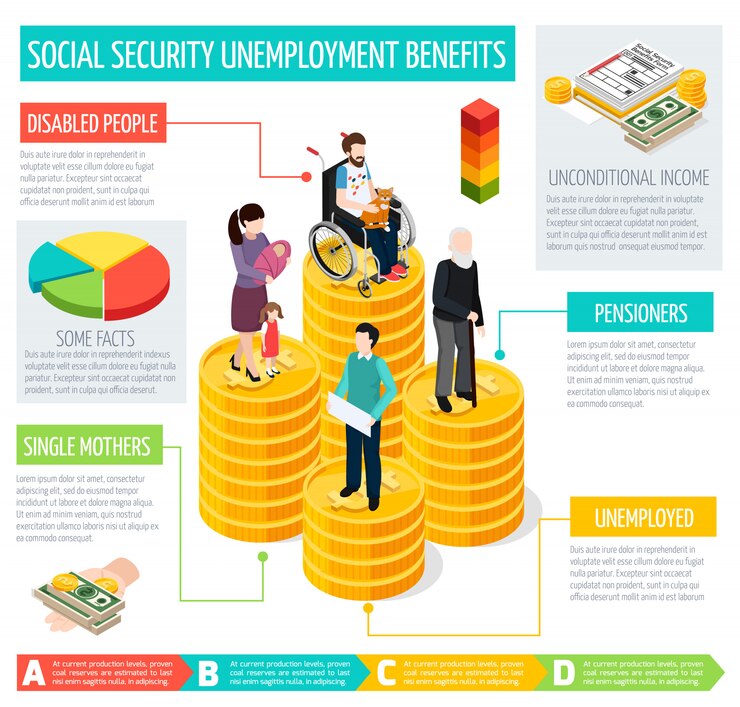The Ultimate Guide to Unlocking Maximum Social Security Benefits: When and How to Claim for Your Financial Future.

Introduction:
Understanding Social Security and Its Importance
Social Security is a vital source of income for millions of Americans in their retirement years, and it serves as a foundation for many people’s financial security during their golden years. It’s a program that many rely on, but not everyone knows how to optimize their benefits to get the most out of their contributions. Whether you’re already approaching retirement or simply planning for your financial future, understanding when and how to claim Social Security benefits is a key decision that can significantly affect your long-term wealth.
Social Security was established in 1935 as a safety net for the older people, disabled, and their families. Today, it is one of the largest government programs in the U.S., providing a financial lifeline for retirees. However, the amount of benefits you receive from Social Security can vary based on when you choose to begin claiming them, how long you work, and how much you earn during your working years. By strategically navigating these factors, you can unlock the maximum Social Security benefits and set yourself up for a more comfortable financial future.
In this guide, we will take a deep dive into everything you need to know about Social Security, from how benefits are calculated to the best time to start claiming them. By the end of this post, you’ll be well-equipped with the knowledge to make the best decision for your financial future.
READ MORE: Maximizing Social Security Benefits | Claiming Social Security Wisely
The Basics of Social Security
Before diving into strategies for maximizing your Social Security benefits, it’s essential to understand the program’s core elements. Let’s start with some fundamental concepts.
Social Security is a government-run program that provides financial benefits to retired individuals, disabled workers, and the families of deceased workers. It’s funded through payroll taxes, known as FICA (Federal Insurance Contributions Act), which are automatically deducted from your paycheck. These taxes are used to support the Social Security trust fund, which is then used to pay benefits to eligible individuals.
Your Social Security benefits are calculated based on your Primary Insurance Amount (PIA), which is the monthly benefit you would receive if you start claiming at your Full Retirement Age (FRA). Your PIA is determined by your average indexed monthly earnings (AIME), which considers your earnings over your highest 35 years of work. Therefore, the higher your lifetime earnings, the higher your Social Security benefits will be.
While the exact calculation involves complex formulas, knowing your work history and understanding the fundamentals of the program is the first step in optimizing your benefits.
Key Terms to Know About Social Security
Navigating Social Security requires an understanding of the key terms and concepts involved in the process. Here are some terms you should familiarize yourself with:
-
Full Retirement Age (FRA): This is the age at which you can start claiming Social Security benefits and receive your full entitlement. Your FRA depends on the year you were born. For most people, it’s between 66 and 67.
-
Primary Insurance Amount (PIA): Your PIA is the amount you’re entitled to receive at your FRA. It’s based on your earnings history, taking into account your 35 highest-earning years.
-
Social Security Earnings Test: If you choose to work and claim benefits before reaching your FRA, your benefits may be reduced based on how much you earn. For example, in 2025, if you earn more than $21,240 before reaching your FRA, your benefits will be reduced by $1 for every $2 you earn above that threshold.
-
Delayed Retirement Credits: If you delay claiming Social Security past your FRA, you can earn delayed retirement credits. These credits increase your benefit by about 8% per year up until the age of 70.
-
Spousal Benefits: If you’re married, you may be entitled to receive up to 50% of your spouse’s PIA. If your spouse passes away, you may also be eligible for survivor benefits based on their earnings history.
These terms are essential to understanding how the Social Security system works and how different decisions about claiming can affect your benefits.
When Should You Claim Social Security?
Deciding when to claim Social Security is one of the most important decisions you will make. The timing of your claim will have a significant impact on how much you receive each month and, by extension, your overall financial security in retirement. Let’s explore the two main options: claiming early versus delaying.
-
Claiming Early: The earliest you can claim Social Security is at age 62. However, this comes at a cost: your benefits will be permanently reduced by as much as 25-30%. While claiming early can provide immediate income, it may not be the best long-term strategy if you can afford to wait.
-
Delaying Your Claim: If you delay claiming until after your FRA, your benefit will increase by approximately 8% per year until you reach age 70. This can result in a significantly higher monthly payment. However, delaying means you will not receive any benefits for those additional years, so it’s a balancing act between earning a higher benefit and waiting to claim.
The decision ultimately depends on factors like your health, your financial needs, and whether you have other retirement savings to draw from. If you can afford to wait, delaying your claim can provide a much larger benefit in the long run.
The Best Age to Start Claiming Social Security
When it comes to determining the best age to claim Social Security, there is no one-size-fits-all answer. However, there are some general guidelines you can follow to make an informed decision:
-
Age 62: If you need income right away or if you have health concerns that may affect your life expectancy, claiming at age 62 might be your best option. However, keep in mind that this will result in a permanently reduced benefit.
-
Age 66-67 (Full Retirement Age): If you can afford to wait until you reach your full retirement age, this allows you to receive your full benefit without any reduction. If you are in good health and don’t need immediate income, this might be the best time to start claiming.
-
Age 70: If you can afford to delay claiming until age 70, your benefit will increase by about 8% per year after your FRA. This is often the optimal age for maximizing your benefit, but it requires significant planning and may not be ideal for everyone.
Each individual’s situation is different, so it’s essential to consider all the factors involved when making your decision.
Factors That Affect Your Social Security Benefit Amount
Several key factors can influence how much you’ll receive in Social Security benefits. Understanding these factors can help you make decisions that maximize your benefit.
-
Your Work History: The more you work and the higher your earnings, the more you will contribute to the Social Security system. Your benefit is based on your 35 highest-earning years. If you have fewer than 35 years of work, your missing years will be counted as zero, which could lower your benefit.
-
Your Age at Retirement: If you claim benefits before your FRA, your monthly payment will be reduced. Conversely, delaying your claim will increase your benefit.
-
Spousal and Survivor Benefits: If you’re married, you may qualify for spousal benefits, which are based on your spouse’s earnings. Additionally, if your spouse passes away, you may be eligible for survivor benefits, which could help you replace a portion of their income.
Understanding these factors can help you make strategic decisions about when to claim Social Security to maximize your monthly payments.
READ MORE: What’s The Maximum Social Security Retirement Benefit?
How Work History Impacts Your Benefits
The amount you’ll receive in Social Security benefits depends largely on your lifetime earnings. The Social Security Administration looks at your highest 35 years of earnings and uses that to calculate your benefit. Here’s how it works:
-
If you worked for more than 35 years, your lowest-earning years will be excluded from the calculation.
-
If you worked for fewer than 35 years, your missing years will be treated as zero, which will reduce your benefit.
For example, if you earned a high salary for 30 years but have five years of low earnings, those five low years will lower your overall average earnings, reducing your benefit. This is why it’s essential to maximize your earnings during your career, especially as you approach your retirement years.
How to Maximize Your Social Security Benefits
There are several strategies you can use to increase the amount of Social Security benefits you receive:
-
Work Longer: The longer you work, the more years of higher earnings you can add to your 35-year work history, which will increase your benefits.
-
Delay Claiming: Waiting to claim Social Security until age 70 will increase your monthly benefit. Each year you delay, your benefit grows by 8%.
-
Coordinate With Your Spouse: If you’re married, you and your spouse can use strategies like “file and suspend” or “restricted application” to maximize both of your benefits.
These strategies can help you get the most out of your Social Security benefits, but they require careful planning.
Social Security Benefits for Married Couples
Married couples can take advantage of unique strategies to maximize their Social Security benefits. For example, one spouse may choose to claim their benefits later, while the other claims early. This can help increase the household’s overall benefit. Additionally, if one spouse has significantly higher earnings, the other may be able to claim spousal benefits, which can be up to 50% of the higher earner’s benefit.
Common Mistakes to Avoid When Claiming Social Security
-
Claiming Too Early: Many people claim Social Security as soon as they turn 62, but this can result in a permanent reduction of benefits. Avoid the temptation to claim too early unless you absolutely need the income.
-
Ignoring Inflation Adjustments: Social Security benefits are adjusted for inflation each year, but many people don’t account for this when planning. Over time, inflation can erode the purchasing power of your benefits.
-
Failing to Plan for Taxes: Social Security benefits are taxable, and many people fail to plan for this tax burden, which can reduce the amount of money they have to spend in retirement.
Conclusion:
A Strategic Approach to Social Security
Maximizing your Social Security benefits requires careful thought and planning. By understanding the system, evaluating your personal circumstances, and using smart strategies, you can unlock the full potential of your benefits and ensure a more comfortable financial future.
FAQs
-
How do I know if I’m eligible for Social Security benefits?
Eligibility depends on your work history and the number of years you’ve worked and paid into Social Security.
-
Can I receive Social Security if I’ve never worked?
Yes, if you were married for at least 10 years, you may be eligible for spousal benefits based on your ex-spouse’s earnings.
-
How can I increase my Social Security benefits?
Work longer, delay your claim, and coordinate with your spouse to maximize your benefits.
-
Is it better to claim Social Security early or wait until 70?
It depends on your personal situation. Delaying can increase your benefits, but claiming early may be necessary if you need income sooner.
-
Will my Social Security benefits be affected if I continue working after claiming?
If you claim before your full retirement age and continue working, your benefits may be temporarily reduced based on your earnings.









This Post Has One Comment